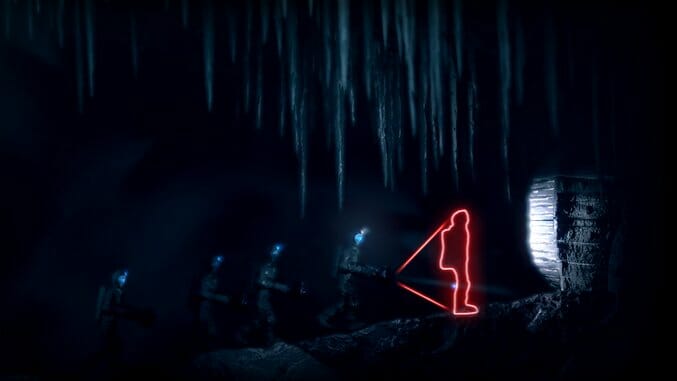The Swapper (PC)

I’ve conditioned myself to be extremely leery of games with sci-fi or “outer space” settings. I’m even leerier, these days, of games which purport to tackle existential or ontological issues—who we are, where we come from, why we exist, and so on. What I bitterly expect tends to be things like bald space marines, caricaturish aliens, and hammy, overwrought writing. That being said, Faceplam Games’s The Swapper, which is a strident combination of two flavors I should utterly hate, actually strikes a solid balance between its sci-fi heritage and its attempt to tackle more universal questions.
Your protagonist is the silent type, donning a space suit and trudging her way through Theseus, an abandoned and derelict space station and research facility full of lethal, talking rocks (this is important so bear with me). Side- and vertical scrolling through this spooky, physics-based puzzle platformer will feel like a Metroidvania-style experience without the combat. Instead of fighting, you’re charged with using your Swapper device to create up to 4 clones of yourself, swapping your consciousness (i.e. player control) in and out of them in order to solve puzzles and collect orbs to unlock parts of the ship and progress through the game. This is where things get fuzzy: After using your Swapper, you’re more likely going to inhabit a “clone” rather than your original body, which means that conserving the “real you” until you can escape the station is a fruitless goal.
I won’t get into too much backstory because, quite frankly, the narrative you have to piece together through collectible logs and vignette-style cut-scenes is a mindfuck of several orders of magnitude. But about the rocks: These porous lumps that are scattered across the ship look like part of the scenery, but are in fact intelligent, telepathic alien life-forms that whisper thoughts to you as you pass by them. They shouldn’t be on the ship; they were mined and transported there, taken away from their home to be studied. Somewhere between this and the events depicted in the game, the Swapper device is invented to help understand them and the vast majority of the crew are killed off by some kind of radiation-style poisoning the rocks defensively emit.
But with that brief summary, I see parallels between The Swapper and other commendable sci-fi media like Vessel or the film Moon. The Swapper does cast into doubt the things videogames almost implicitly take for granted, like the significance of death when your avatar is basically immortal and completely artificial. It questions things like sentience or intelligence (as we understand or express them) as metrics for valuing life. It ruminates on the fundamental connection between the mind and the body, and of memory as a vital component of identity from a metaphysical and neurobiological perspective. And with that, of course, is a wink and a nod, because playing a videogame implies imbuing my own consciousness into something that is basically mechanical and unfeeling. A videogame is like a body that needs minds swapped into it in order to do anything meaningful, with the line between virtual and “meat”space becoming increasingly blurred.
(And I’ll admit, I’m jumping for joy that a thoughtful piece of science fiction happens to be a game featuring an all-woman primary cast. It’s rare. I’m literally jumping.)
It manages these questions, mostly, with panache. I won’t pretend The Swapper doesn’t sometimes err into the cardinal sins of hammy overwroughtness from time to time, or the dreadful (both to commit and to have to spell out) ludonarrative dissonance. I should preface by conceding it’s appropriate that a story told mostly through antecedent action (think Portal 2) would unravel via exploration of the environment and discovery of embedded objects. I expect narrative to be injected into discoverable things more or less passively until the end because part of my job as a player is to piece the puzzle of “what happened” together rather than fixate on “what’s happening now.” This exploratory, cerebral approach underpins the puzzle element and complements the moody, meditative atmosphere
